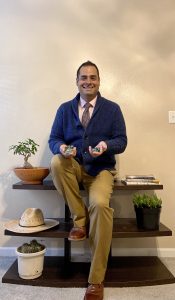
Kenly Maldonaldo is a Ph.D. student in systems engineering and a research and development systems engineer at Sandia National Laboratories (SNL) in the high confidence systems environmental group.
Maldonaldo received his B.S. in information and communication technologies from New Mexico State University and his M.S. in information management from Arizona State University.
What is the focus of your research?
I have completed my coursework and am starting my dissertation portion of my Ph.D. in Systems Engineering under Dr. Steve Simske. The research that Dr. Simske and I are doing centers on the development of economical, intelligent, microcomputer clusters that are deployable to monitor, surveil, control and safeguard dangerous or sensitive materials. This work is primarily focused towards government agencies in developing countries.
What sparked my interests in this research idea was wanting to help national laboratories and the International Atomic Energy Agency (IAEA) by looking at incidents that have happened around the world when left and/or stolen materials were not properly monitored and controlled by government agencies.
As an example, what happened in Lebanon, Beirut with the secondary explosion of dangerous materials (radioactive, toxic or explosive) is why we are developing the Situational Strategic Awareness Monitoring Surveillance System (SSAMSS).
I’m working on using Raspberry Pi clusters, Statistical Process Control, Artificial Intelligence, Systems Engineering, Model-Based Systems Engineering and System Model Language (SySML) as the foundational bases of the development of SSAMSS to look at how to address the root cause problems of safeguarding humans and environments from hazardous materials.
How do you implement systems-thinking in your job?
Systems-thinking and engineering is a superpower! Should we use it for good or evil? As a systems thinker, engineer and Ph.D. student it’s important to realize that you can construct (create) and deconstruct (reverse-engineer) all things while providing solutions to answer root cause problems. Those things are impactful, resulting in ripple effects throughout our society, humanity, environmental and culture.
It is critical that we as systems-thinkers and engineers consider these impacts and work towards the betterment of the world. It is important that we realize that we are role models by what we do and how we do things ethically and morally. As a systems-thinker I ask myself these types of questions daily as I work developing systems to improve and safeguard people’s lives.
What do you like to do when you aren’t working/taking classes?
If I’m not playing with microcomputers or solar power systems, I’m usually backcountry backpacking or working with recycled materials for building homes i.e., earth ships, earth block or earthbag homes. I also spend a lot of time with my wife and daughter hiking trails.
What’s the last book you read and movie you watched?
I’m in the middle of reading Meta-Algorithmics: Patterns for Robust, Low Cost, High Quality Systems by Steven J. Simske. The last movie I watched was Howard Zinn: A People’s History of the United States.
Who inspires you?
People who use their talents to create a better world for themselves and everyone around them while mentoring others. Along with my advisor Dr. Simske, I look up to individuals who use their abilities to help solve real problems. Another inspiration at a young age was my biology teacher, Dr. Bob Dorsett, who did the same with his talents.
Both Dr. Simske and Dr. Dorsett used their abilities to help others. For example, Dr. Simske used data clustering to locate and stop a criminal enterprise that was selling counterfeit printer ink in South America. Dr. Dorsett went to remote countries in the Himalayas to provide free heatlhcare to poor villages while mentoring me to do the same.
What’s a fun fact about you many people may not know?
I am the first of my family in the United States to go to college. Both my parents migrated from Mexico. Being a first-generation Mexican-American getting a Ph.D. in my family is extremely important to me. I hope that I am an inspiration to all people who come from similar backgrounds to never stop pursuing their educational goals, as hard work and determination pays off.
_____________________
Read Maldonaldo’s paper published in the Journal of Imaging Science and Technology: